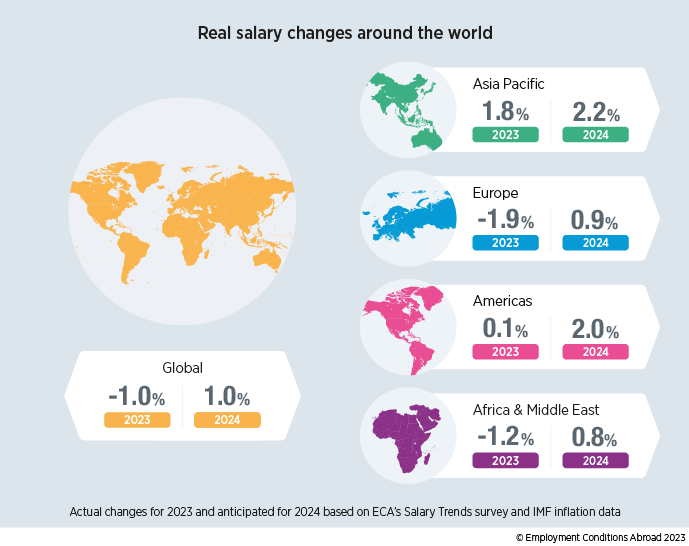With the knock-on effects of Russia’s invasion of Ukraine, as well as the hangover from supply chain issues, manufacturing delays and a shortage of raw materials in a post-pandemic era, many countries around the world are still experiencing higher than usual levels of inflation. Governments have introduced targeted policies to help curb inflationary pressures and although pay awards are still being outpaced by inflation for the majority of countries surveyed, ECA’s latest Salary Trends Survey has found that the outlook is starting to look more promising for employees.

The real-terms salary increases illustrated in the above graphic are calculated by taking the salary increase given to employees by their employers (the nominal increase) and subtracting the rate of inflation.
Higher pay awards for 2023 outweighed by inflation
Globally, nominal salary increases in 2023 were 5.1%, an increase of around one percentage point compared to 2022. However, once inflation is factored in, employees actually experienced a 1% decrease on average in real terms, meaning their buying power is now lower than it was last year. Although this is disappointing, it is not surprising as a real-terms fall was projected for 2023 in last year’s survey. To make matters worse, although the nominal increases awarded by employers in 2023 were in line with those forecast in 2022, inflation remaining higher than expected meant that the real-terms decrease ended up higher than forecast.
Although employees in the majority of countries surveyed were worse off in real terms for the second year in a row, the decreases in 2023 were generally not as significant or as widespread as they were in 2022. Looking to 2024, the forecasted results from the survey indicate that this positive trend is set to continue. Employers in most regions are expecting to provide nominal salary increases at a similar level to this year despite expectations that the rate of inflation will slow further. For the first time in three years, many employees across the globe are expected to see their buying power rise, with over 80% of countries surveyed expected to see increases in real terms.
Reactions to changes in inflation
Although we have seen higher than usual nominal pay awards in countries with elevated levels of inflation, the widespread real-terms decreases seen in the past two years show that inflation is just one factor influencing pay awards, and high inflation does not necessarily mean pay awards will increase to match. Reactions to changes in inflation can often be delayed, and this is reflected in the survey results.
The UK is a good example of a developed country which has struggled with high inflation, but where average nominal salary changes (shown by the blue line below) tended to be relatively consistent from year to year in ‘normal’ times.
Although still considerably below inflation (shown by the purple line), the nominal increase of 5% for 2023 was historically high. What is interesting to see is that even though inflation is expected to fall considerably in 2024, employers are not expected to react to this with a lower pay award. The nominal increase is set to remain the same into 2024, offering some respite to UK workers who have suffered real-terms salary decreases since 2021.
These signs of recovery are present in many countries that have experienced real-terms salary decreases in the past two years, such as Australia, France and the USA. As the recovery from spikes in inflation continues, nominal salary awards remaining higher than usual may suggest that employers are planning to spread more generous pay rises over a longer period, having not been able to afford to keep pace with inflation previously.
Even in countries that have been less affected by high levels of inflation, there is also evidence of signs of recovery. Countries in the Asia-Pacific region have generally not seen spikes in inflation to the same extent as elsewhere, meaning the region avoided the real-terms salary decreases experienced in the rest of the world. Despite this relatively positive situation, nominal pay awards in many countries in the region were not immune from the sharp dips seen around the world at the height of the Covid-19 pandemic. Although not expected to surpass pre-pandemic levels as in the example above, nominal pay awards in many countries in the region are expected to recover to those levels in 2023 and 2024.
Cautious optimism for the future
Although there is a more positive outlook next year, it is understandable that both employers and employees remain cautious given the unforeseen circumstances experienced globally in recent years, as well as high inflation having proved more persistent than initially expected. However, there are encouraging signs that the pain of recent years may be starting to ease.
FIND OUT MORE
To hear more on this topic, join our free webinar on Wednesday 29 November (14:30-15:00 GMT) to find out how salary increase rates have fared in major economies around the world.
The complex macroeconomic factors at play within the setting of salaries are covered in detail in ECA’s Salary Trends Reports which are published for over 70 countries and cities. The reports include graphical and tabular data plus economic analysis and, where possible, data for specific industry groups. Free to survey participants, they can also be purchased either individually or as a full set.
To find out more about the 2023 Salary Trends Survey and its findings, you can also view the latest press releases on our News page.
The latest currency and inflation news is covered in ECA’s blog. Make sure you are signed up to follow our blog to receive notifications when new posts are published (in-house GM/HR professionals only).
Please contact us to speak to a member of our team directly.